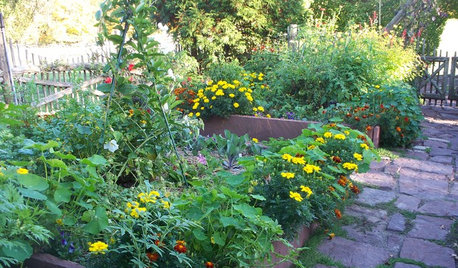organic pesticides?
WhatKatydid
10 years ago
Related Stories

GARDENING GUIDESHow to Switch to an Organic Landscape Plan
Ditch the chemicals for a naturally beautiful lawn and garden, using living fertilizers and other nontoxic treatments
Full Story
DECORATING GUIDESGet Organized: A Place for Your Pets' Stuff
Live in style with your cat or dog thanks to special places for their food, bed and toys
Full Story
GARDENING GUIDESOrganic Matters: Thwart Insect Pests With Trap Crops
Add a few sacrificial plants to your garden to lure insects away from the harvest
Full Story
FURNITUREEasy Green: Stylish Ecofriendly Furniture
Organic fabrics and sustainably harvested wood mean you can feel good about your furniture choices in more ways than one
Full Story
ORGANIZINGSmart Solutions for Clothes Closets
The Hardworking Home: Explore these ways to store your clothes, shoes and accessories to make the most of your space
Full Story
HOUSEKEEPING10 Things Neat Freaks Know to Be True
Do you err on the incredibly tidy side? Then you probably already live by these nuggets of neat wisdom
Full Story
STORAGEStroke of DIY Genius: Get Hooked on These 15 DIY Storage Hacks
These DIY homeowner ideas include a repurposed vintage tennis racket and reclaimed-wood pieces
Full Story
FALL GARDENING5 Ways to Put Fall Leaves to Work in Your Garden
Improve your soil and yard the organic way with a valuable garden booster that grows on trees
Full Story
EDIBLE GARDENSGarden BFFs? Why Your Vegetables Are Begging for Companion Plants
Foster friendships among plants for protection from pests, pollination support and color camaraderie
Full Story
INSPIRING GARDENSInside Houzz: A Waterfront Property Ditches the Grass for a Garden
New drought-tolerant plantings and outdoor gathering spaces help this California backyard take in the view without wasting space or water
Full Story






Kimmsr
SamWright
Related Professionals
Erie Landscape Architects & Landscape Designers · South Orange Landscape Architects & Landscape Designers · Brooklyn Center Landscape Architects & Landscape Designers · Wilmington Landscape Contractors · Brandon Landscape Contractors · Concord Landscape Contractors · Crystal Landscape Contractors · Madera Landscape Contractors · Mount Sinai Landscape Contractors · Peachtree City Landscape Contractors · The Woodlands Landscape Contractors · West Palm Beach Landscape Contractors · Alvin Decks, Patios & Outdoor Enclosures · Diamond Bar Decks, Patios & Outdoor Enclosures · Surfside Decks, Patios & Outdoor EnclosuresOlga2013
Kimmsr
greentiger87
WhatKatydidOriginal Author
brittiem
Kimmsr
WhatKatydidOriginal Author
gardengal48 (PNW Z8/9)
woohooman San Diego CA zone 10a
Kimmsr
WhatKatydidOriginal Author
gardengal48 (PNW Z8/9)